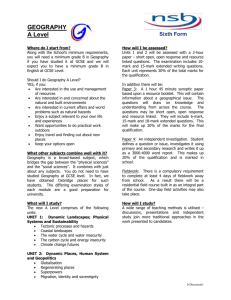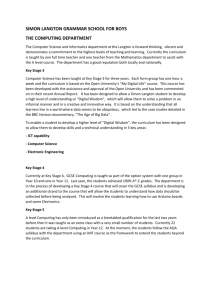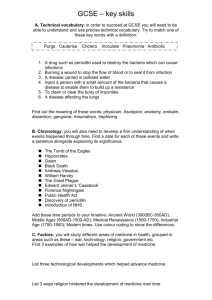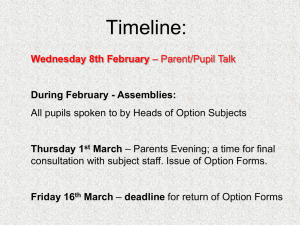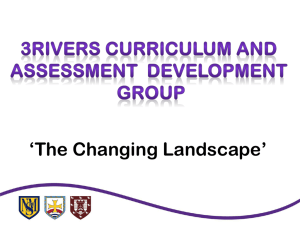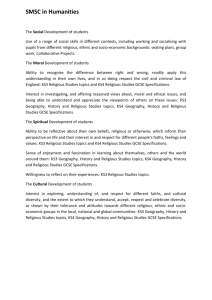msword
advertisement
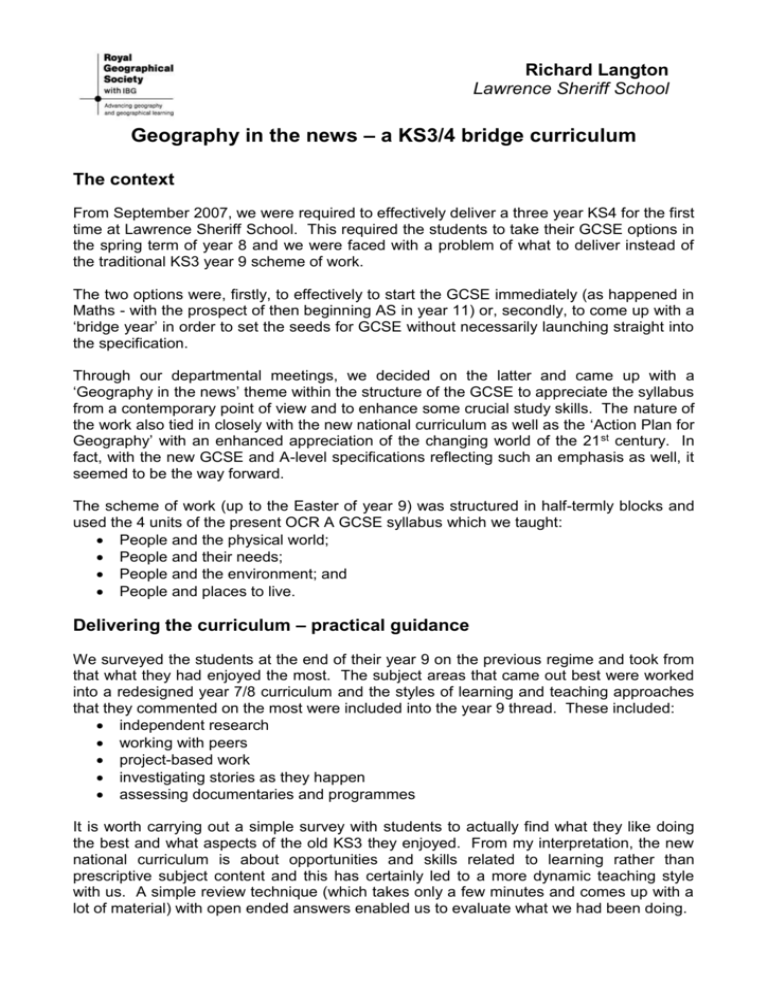
Richard Langton Lawrence Sheriff School Geography in the news – a KS3/4 bridge curriculum The context From September 2007, we were required to effectively deliver a three year KS4 for the first time at Lawrence Sheriff School. This required the students to take their GCSE options in the spring term of year 8 and we were faced with a problem of what to deliver instead of the traditional KS3 year 9 scheme of work. The two options were, firstly, to effectively to start the GCSE immediately (as happened in Maths - with the prospect of then beginning AS in year 11) or, secondly, to come up with a ‘bridge year’ in order to set the seeds for GCSE without necessarily launching straight into the specification. Through our departmental meetings, we decided on the latter and came up with a ‘Geography in the news’ theme within the structure of the GCSE to appreciate the syllabus from a contemporary point of view and to enhance some crucial study skills. The nature of the work also tied in closely with the new national curriculum as well as the ‘Action Plan for Geography’ with an enhanced appreciation of the changing world of the 21 st century. In fact, with the new GCSE and A-level specifications reflecting such an emphasis as well, it seemed to be the way forward. The scheme of work (up to the Easter of year 9) was structured in half-termly blocks and used the 4 units of the present OCR A GCSE syllabus which we taught: People and the physical world; People and their needs; People and the environment; and People and places to live. Delivering the curriculum – practical guidance We surveyed the students at the end of their year 9 on the previous regime and took from that what they had enjoyed the most. The subject areas that came out best were worked into a redesigned year 7/8 curriculum and the styles of learning and teaching approaches that they commented on the most were included into the year 9 thread. These included: independent research working with peers project-based work investigating stories as they happen assessing documentaries and programmes It is worth carrying out a simple survey with students to actually find what they like doing the best and what aspects of the old KS3 they enjoyed. From my interpretation, the new national curriculum is about opportunities and skills related to learning rather than prescriptive subject content and this has certainly led to a more dynamic teaching style with us. A simple review technique (which takes only a few minutes and comes up with a lot of material) with open ended answers enabled us to evaluate what we had been doing. Richard Langton Lawrence Sheriff School Lawrence Sheriff School – Department of Geography End of year review Have you enjoyed Geography this year? YES NO What aspects have you enjoyed? Why? What have you least enjoyed? Why? Where do you feel you have performed closest to you potential? Why? The overview of the year is set out in the topic outline file, which was given to the students. They each have an A3 scrap book folder which they keep at school and display the majority of their work in. See: Topic outlines 08-09 A3 scrapbook folders Richard Langton Lawrence Sheriff School As it is effectively a GCSE option now, we have 3 timetabled lessons a week. These are split between three styles of teaching: 1. News review – preparation of scrap books with articles and annotation with wider research - students to review articles from the week either in pairs, small groups or as a class – discussion of key themes 2. Teacher-led – Class-based activity using recent TV footage or articles 3. ICT suites - computer-based research/presentation lesson - students will also have a virtual folder on the school’s shared network with research and presentations 1. News review The weekly homework for the students Is to find an article and associated wider research (to be able to answer the 5 key questions) based upon the theme that we were following. Time was spent with them at the start of the year on how to access the main news websites and how to effectively follow links/research around the topic. They were expected to bring in 3/4 sides of printed pages of which they would then produce an A3 page in the lesson. The article templates were copied onto A3 pages and the idea was to stick the main part of the article in the middle. The students would then answer the 5 key questions (with the prompt power point running on a loop) using their research. Laptops connected to the internet and atlases were also available in the classroom to aid their work. Reserve articles were produced on a weekly basis for those who forgot the H/W and the school disciplinary process was followed through with these students. Scissors and glue were made available in the classroom as well. As a teacher, the intention was to speak to every student during the lesson to discuss their article and check their misunderstanding. Some students bring in articles based on the headline, not really understanding what it was about so it was important to get round to these students and prompt further research. Generally, there would be 4/5 main themes of the articles each week and the follow-up activities would be structured around students discussing their work with others who have different types of articles. These follow-ups varied between paired, small group and whole class discussions. The scrapbooks are marked every 3/4 weeks on average and a grid is put into the back of the folder so that they can track their progress (see separate marking grid). The date, number of articles remembered, types of articles and comments are added. GCSE grades (as well as an effort mark) have been are used throughout but we have been careful not to give out too many A/A*s, highlighting a C grade as meeting expectations and a B above, etc. This was considered to raise issues of progress in year 10/11. See: 5 questions power-point Article template Year 9 scrapbooks marking grid Book cover Richard Langton Lawrence Sheriff School Completed article reviews 2. Teacher led The teacher led aspect of the year has enabled us to keep up to date with programmes and series both on mainstream TV and through bought material that would have been otherwise difficult to use. The lessons follow the main theme again and the activities focus on different types of study skills – e.g. note taking in the form of mind maps, timelines, structuring arguments etc. Various writing frames have also been used. Again, this is very flexible and, indeed, the different teachers at Lawrence Sheriff have actually used different programmes at times, but series such as ‘Power of the Planet’, ‘Planet Earth’, ‘An inconvenient truth’, etc have been universally used. 3. ICT suites One of the key elements of the year has been the opportunity to secure ICT rooms for each group for one of their lessons for the week. The element of ICT in Geography was highlighted as a major positive point from students and we were eager to involve this. Richard Langton Lawrence Sheriff School The separate power-point highlights some of the projects we have followed over the past 18 months and some of the assessment sheets used to mark them. The tasks have varied in their context (again dependent on the broad theme) and in their mode of delivery: Groups of 3 presenting news broadcasts incorporating power-point with student filming and downloaded video footage Paired issues-based research and associated power-point presentations Individual articles and research portfolios As we have just one lesson a week in the ICT suites, it generally takes half a term to run the project through with research and presentations. Smaller activities have also been used to supplement work done in the other two lessons of the week – such as some follow-up to programmes in the ‘Power of the Planet’ series. Assessment is generally in the form of analysis sheets which break down the components of the presentations. Examples of these are included in the projects power-point. The work in the spring term (on the environment) has also been supplemented with fieldwork to the Botanical gardens in Birmingham in a joint venture with Biology (we also visit the Think-tank) to focus upon rainforest destruction. See: Projects power-point Evaluating the first year One of the main advantages of the students taking their options in year 8 was that we received those who were interested in the subject. Many were motivated just by the fact that they had control of much of the work they did. The numbers choosing the subject rose from approximately 55 in the first year to over 70 in the second from the same number in the year group (approximately 110). This was after they had seen the previous years’ work before choosing their options and through speaking to students who had experienced it. The feedback forms which the students filled in were very positive on the whole, although a few said that Easter was a natural time to stop as the article process could eventually become tedious. From a teacher’s point of view, the initial setting-up of the curriculum took up a lot of time, but this hasn’t been the case with the second year. As the students are so involved in everything that is going on, it actually feels as if you give less to the lesson from a didactic perspective which has to be positive. We decided to begin the GCSE specification after Easter and have found with the present year 10s that they are both ahead of where we would have been in previous years and also that their contextual subject knowledge is so much better. In all, the exercise has been an extremely positive experience that the students have seen a real purpose in. It is something which could be applied to lower years in the school in a trimmed down context (certainly with the scrapbooks) to fit in with different schools’ curriculum structures.
